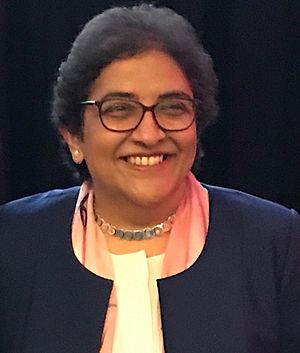Sadaf Farooqi facts for kids
Quick facts for kids
Sadaf Farooqi
FMedSci FRS
|
|
|---|---|

Professor Sadaf Farooqi at the American Diabetes Association's 79th Scientific Session, June 2019
|
|
| Born |
Ismaa Sadaf Farooqi
|
| Alma mater |
|
| Known for | Genetics of obesity |
| Scientific career | |
| Fields | |
| Institutions |
|
| Thesis | Genetics of severe childhood obesity (2001) |
Ismaa Sadaf Farooqi is a leading scientist and professor at the University of Cambridge in the UK. She is also a doctor at Addenbrooke's Hospital. Professor Farooqi studies how our bodies work, especially focusing on how we use energy and why some people become overweight. She is known for her important discoveries about the genetics of obesity.
Contents
Becoming a Scientist
Sadaf Farooqi studied medicine at the University of Birmingham. She earned her first degree in 1993. After working as a junior doctor, she decided to focus on research.
In 2001, she earned her PhD from the University of Cambridge. Her research looked into the genetics of severe childhood obesity. This means she studied how our genes can affect how much we weigh, especially in children.
Discovering Obesity Genes
Professor Farooqi's main research explores the genetics of obesity. She wants to understand why some people gain weight more easily than others. Her team looks for specific gene changes in people with severe obesity.
- They found changes in genes related to leptin. Leptin is a hormone that tells your brain when you've eaten enough.
- They also found changes in the leptin receptor. This is like the "door" on cells that leptin needs to open.
- Her team also studied the Melanocortin 4 receptor (MC4R). This is another important part of the brain's system for controlling appetite.
Her research has shown that a system in the brain, involving leptin, is key to controlling how much humans eat.
How Genes Affect Food Choices
Professor Farooqi's lab has also found interesting links between genes and food preferences.
- People with certain changes in the MC4R gene might prefer foods high in fat. For example, they might like creamy dishes like chicken korma more.
- However, these same people might not like sugary foods as much, like Eton mess.
This shows how our genes can even influence the types of food we enjoy!
Other Important Discoveries
Her research has also made other big discoveries:
- Changes in a gene called KSR2 can be linked to insulin resistance. This is when the body's cells don't respond well to insulin, which helps control blood sugar.
- Genetic changes in the FTO gene are linked to feeling less hungry. This means some people might not feel full as easily due to their genes.
Her work has received funding from groups like the Wellcome Trust.
Awards and Recognition
Professor Farooqi has received many important awards for her work.
- In 2021, she was chosen as a Fellow of the Royal Society. This is a very high honor for scientists in the UK.
- She was also elected a Fellow of the Academy of Medical Sciences in 2013.
Her election citation praised her for changing how we understand human obesity. It said her work helped discover the first gene changes that cause obesity. She showed that problems with how the brain controls appetite and feeling full are key. Her research has helped doctors around the world better understand and diagnose obesity.
In 2017, she was interviewed on a popular science radio show called The Life Scientific on BBC Radio 4.
In 2019, the American Diabetes Association gave her their Outstanding Scientific Achievement Award.
 | Dorothy Vaughan |
 | Charles Henry Turner |
 | Hildrus Poindexter |
 | Henry Cecil McBay |

